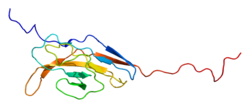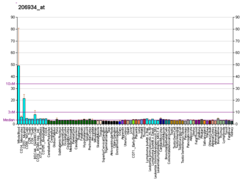From Wikipedia, the free encyclopedia
Signal-regulatory protein beta-1 is a protein that in humans is encoded by the SIRPB1 gene .[ 5] [ 6] [ 7] CD172B (cluster of differentiation 172B).
The protein encoded by this gene is a member of the signal-regulatory-protein (SIRP) family, and also belongs to the immunoglobulin superfamily. SIRP family members are receptor-type transmembrane glycoproteins known to be involved in the negative regulation of receptor tyrosine kinase-coupled signaling processes. This protein was found to interact with TYROBP/DAP12, a protein bearing immunoreceptor tyrosine-based activation motifs . This protein was also reported to participate in the recruitment of tyrosine kinase SYK. Alternatively spliced transcript variants have been found for this gene.[ 7]
Interactions
SIRPB1 has been shown to interact with TYROBP .[ 8] [ 9]
References
Further reading
Dietrich J, Cella M, Seiffert M, et al. (2000). "Cutting edge: signal-regulatory protein beta 1 is a DAP12-associated activating receptor expressed in myeloid cells" . J. Immunol . 164 (1): 9–12. doi :10.4049/jimmunol.164.1.9 PMID 10604985 . Tomasello E, Cant C, Bühring HJ, et al. (2000). "Association of signal-regulatory proteins beta with KARAP/DAP-12" . Eur. J. Immunol . 30 (8): 2147–56. doi :10.1002/1521-4141(2000)30:8<2147::AID-IMMU2147>3.0.CO;2-1 PMID 10940905 . Deloukas P, Matthews LH, Ashurst J, et al. (2002). "The DNA sequence and comparative analysis of human chromosome 20" . Nature . 414 (6866): 865–71. Bibcode :2001Natur.414..865D . doi :10.1038/414865a PMID 11780052 . Cannon JP; Haire RN; Litman GW (2002). "Identification of diversified genes that contain immunoglobulin-like variable regions in a protochordate". Nat. Immunol . 3 (12): 1200–7. doi :10.1038/ni849 . PMID 12415263 . S2CID 19367972 . Strausberg RL, Feingold EA, Grouse LH, et al. (2003). "Generation and initial analysis of more than 15,000 full-length human and mouse cDNA sequences" . Proc. Natl. Acad. Sci. U.S.A . 99 (26): 16899–903. Bibcode :2002PNAS...9916899M . doi :10.1073/pnas.242603899 . PMC 139241 PMID 12477932 . Suzuki Y, Yamashita R, Shirota M, et al. (2004). "Sequence Comparison of Human and Mouse Genes Reveals a Homologous Block Structure in the Promoter Regions" . Genome Res . 14 (9): 1711–8. doi :10.1101/gr.2435604 . PMC 515316 PMID 15342556 . Gerhard DS, Wagner L, Feingold EA, et al. (2004). "The Status, Quality, and Expansion of the NIH Full-Length cDNA Project: The Mammalian Gene Collection (MGC)" . Genome Res . 14 (10B): 2121–7. doi :10.1101/gr.2596504 . PMC 528928 PMID 15489334 . Liu Y, Soto I, Tong Q, et al. (2006). "SIRPbeta1 is expressed as a disulfide-linked homodimer in leukocytes and positively regulates neutrophil transepithelial migration" . J. Biol. Chem . 280 (43): 36132–40. doi :10.1074/jbc.M506419200 PMID 16081415 . Liu T, Qian WJ, Gritsenko MA, et al. (2006). "Human Plasma N-Glycoproteome Analysis by Immunoaffinity Subtraction, Hydrazide Chemistry, and Mass Spectrometry" . J. Proteome Res . 4 (6): 2070–80. doi :10.1021/pr0502065 . PMC 1850943 PMID 16335952 . Laplana M, Royo JL, Aluja A, López R, Heine-Sunyer H, Fibla J (September 2014). "SIRPB1 copy‐number polymorphism as candidate quantitative trait locus for impulsive‐disinhibited personality" . Genes, Brains and Behavior . 13 (7): 653–62. doi :10.1111/gbb.12154 PMID 25039969 .
External links
This article incorporates text from the United States National Library of Medicine , which is in the public domain .
1–50 51–100 101–150 151–200 201–250 251–300 301–350








